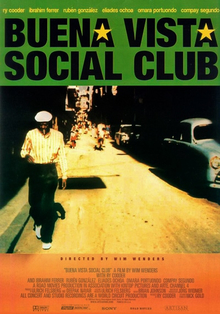Buena Vista Social Club (film)
| Buena Vista Social Club | |
|---|---|
 Theatrical release poster | |
| Directed by | Wim Wenders |
| Written by | Wim Wenders |
| Produced by |
|
| Starring | see below |
| Cinematography | Jörg Widmer |
| Edited by | Brian Johnson |
Production companies | |
| Distributed by |
|
Release dates |
|
Running time | 105 minutes[1] |
| Countries |
|
| Languages |
|
| Box office | $23 million[2] |
Buena Vista Social Club is a 1999 documentary film directed by Wim Wenders about the music of Cuba. It is named for a danzón that became the title piece of the album Buena Vista Social Club. The film is an international co-production of Germany, the United States, the United Kingdom, France, and Cuba.
In 2020, the film was selected for preservation in the United States National Film Registry by the Library of Congress as being "culturally, historically or aesthetically significant".[3]
Content
[edit]The film documents how Ry Cooder, a long-time friend of Wenders, brought together the ensemble of legendary Cuban musicians to record an album (also called Buena Vista Social Club) and to perform twice with a full line-up: in April 1998 in Amsterdam (two nights) and the 1st of July 1998 in the United States (at the Carnegie Hall, New York City). Although they are geographically close, travel between Cuba and the United States is restricted due to the political tension between the two countries, so many of the artists were travelling there for the first time. The film shows their reactions to this experience, as well as including footage of the resultant sell-out concert. It also includes interviews with each of the main performers.
Musicians
[edit]- Francisco Repilado, aka Compay Segundo (vocals and tres)
- Eliades Ochoa (vocals and guitar)
- Ry Cooder (slide guitar)
- Joachim Cooder, Ry's son (percussion)
- Ibrahim Ferrer (vocals, congas, claves, bongos)
- Omara Portuondo (vocals)
- Rubén González (piano)
- Orlando "Cachaito" López (Double bass)
- Amadito Valdés
- Manuel "Guajiro" Mirabal (trumpet)
- Barbarito Torres (laúd)
- Pío Leyva
- Manuel "Puntillita" Licea (vocals)
- Juan de Marcos González (güiro)
Songs
[edit]- "Chan Chan" (Francisco Repilado)
- "Silencio" (Rafael Hernandez)
- "Chattanooga Choo Choo" (Harry Warren and Mack Gordon)
- "Dos Gardenias" (Isolina Carillo)
- "Veinte Años" (María Teresa Vera)
- "Y Tu Que Has Hecho?" (Eusebio Delfin)
- "Black Bottom" (Ray Henderson, Lew Brown and B. G. De Sylva)
- "Canto Siboney" (Ernesto Lecuona Casado)
- "El Carretero" (Jose "Guillermo Portabales" Quesada del Castillo)
- "Cienfuegos (tiene su guaguanco)" (Victor Lay)
- "Begin the Beguine" (Cole Porter)
- "Buena Vista Social Club" (Orestes Lopez, inventor of the mambo in 1937)
- "Mandinga" (also known as "Bilongo", Guillermo Rodriguez Fiffe)
- "Candela" (Faustino Oramas),
- "Chanchullo" (Israel "Cachao" Lopez, the father of Cachaito)
- "El Cuarto de Tula" (son/descarga, Sergio Siaba)
- "Guateque Campesino" (Celia Romero "Guateque")
- "Nuestra Ultima Cita" (Forero Esther)
- "Quizás, Quizás, Quizás" (bolero by Oswaldo Farres)
Release
[edit]Critical reception
[edit]Buena Vista Social Club received critical acclaim. On Rotten Tomatoes, the film has a 92% score based on 48 reviews, with an average rating of 7.5/10. The consensus summarizes: "A hopeful gesture of cultural outreach set to an irresistible soundtrack, Buena Vista Social Club is an enriching and zesty experience."[4] Metacritic reports an 81 out of 100 rating based on 19 critics.[5]
Accolades
[edit]The film was nominated for an Academy Award for best documentary feature in 2000.[6] It won as best documentary in the European Film Awards as well as many others. The album Buena Vista Social Club features studio versions of the music heard in the film.
Influence
[edit]The film helped the musicians, some of them already in their nineties, become known to a worldwide audience, with some going on to release popular solo albums. These included Ibrahim Ferrer, Compay Segundo, Rubén González and Elíades Ochoa. The latter went on to support younger musicians making the same style of music beyond 2010 under the name "Buena Vista Social Club".
See also
[edit]References
[edit]- ^ "BUENA VISTA SOCIAL CLUB (U)". British Board of Film Classification. 2 July 1999. Retrieved 9 February 2016.
- ^ "Buena Vista Social Club". Box Office Mojo. IMDB. Retrieved 10 August 2014.
- ^ McNary, Dave (14 December 2020). "'Dark Knight,' 'Shrek,' 'Grease,' 'Blues Brothers' Added to National Film Registry". Variety.
- ^ "Buena Vista Social Club (1999)". Rotten Tomatoes. Flixster. Retrieved 15 November 2024.
- ^ "Buena Vista Social Club reviews". Metacritic. CBS Interactive. Retrieved 9 February 2016.
- ^ "Buena Vista Social Club". Movies & TV Dept. The New York Times. 2007. Archived from the original on 8 December 2007. Retrieved 22 November 2008.
External links
[edit]- 1999 films
- 1999 documentary films
- 1999 independent films
- 1990s American films
- 1990s British films
- 1990s English-language films
- 1990s French films
- 1990s German films
- 1990s Spanish-language films
- American independent films
- American musical documentary films
- British musical documentary films
- British independent films
- Buena Vista Social Club
- Cuban documentary films
- Documentary films about Cuba
- English-language documentary films
- English-language French films
- English-language German films
- English-language independent films
- European Film Awards winners (films)
- Films directed by Wim Wenders
- Films set in 1998
- Films shot in Amsterdam
- Films shot in Cuba
- Films shot in New York City
- Films shot in the Netherlands
- Films with screenplays by Wim Wenders
- French documentary films
- French independent films
- German independent films
- German musical documentary films
- Satellite Award–winning films
- United States National Film Registry films
